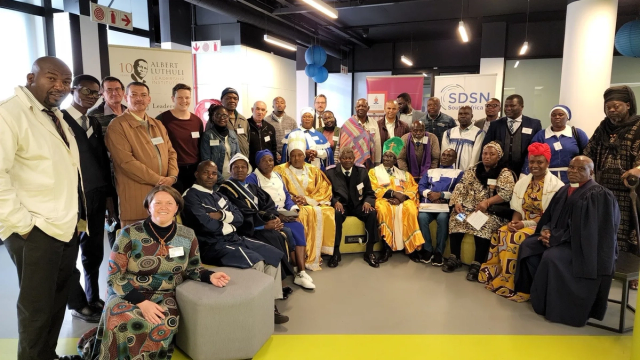Southern Africa Regional Forum on Religion and Covid-19
Religious leaders, academics, government and multilateral representatives from Southern Africa discussed lessons and recommendations from the region's response to the Covid-19 pandemic
On August 22nd, religious leaders, academics, government and multilateral representatives from Southern Africa met at the University of Pretoria to discuss lessons learnt from the region's response to the Covid-19 pandemic. This Regional Forum on Religion and Covid-19 in Southern Africa focused on understanding the role of religious actors in dealing with the pandemic, the role of information and resource availability and the general impact of decisions made by the government on the development of communities. The event was organised as a partnership between SDSN South Africa , Humboldt University , World Vision, the Faculty of Theology and Religion at the University of Pretoria , the International Network for Religious Communities and Sustainable Development (IN//RCSD), and the international Partnership on Religion and Sustainable Development (PaRD).
There was a lively exchange among the participants on the following topics:
- The impact of Covid-19 on organisations and communities
Participants shared how those who needed help the most during and following the pandemic were - and often continue to be - the ones who find themselves excluded. Lack of access to data and technology meant that the poorest of the poor felt themselves further severed as community contact was disrupted. - The way in which prevention activities were managed at the local level
The failure to offer indigenous traditions a voice at the table emerged strongly throughout the day. With reference to preventative measures such as vaccines, a choice was never offered. Government consultation included certain religious fraternities, while excluding others, most notably the traditional African religions. Participants described significant inter-religious and inter-denominational collaboration during this period in order to prioritise assisting the community during this difficult time, with issues addressed ranging from bereavement rituals, psychosocial support, and providing food. - Financial factors and impact
The pandemic continues to have detrimental effects on the economy. Costs of living increased substantially while income did not, and unemployment rose at an unprecedented rate. Religious organisations did their best by continuing service to the community amidst a significant lowering of income and difficulty keeping up with monthly municipal expenses for buildings they were not allowed to use during lockdown. Religious leaders applauded members for being able to share the little that they did have. As one participant put it, “When you know poverty, you know the value of sharing, people with very little often share the most”. - Success of measures to manage the impact of Covid-19
Non-pharmaceutical interventions instilled greater awareness regarding personal hygiene among the community. However, extended lockdowns failed to produce the intended results while generally setting back development progress by many years and leaving communities in dire straits. - Preparedness for future pandemics and other disasters.
Participants discussed policy recommendations for responses to both future pandemics and the continuing impact of Covid-19 on communities. Interfaith collaboration to increase development impact was the most crucial learning of the pandemic. Further to this, leaders strategized about formalising inclusive forums in order to ensure that traditional religions would be included in future consultations with governments.
From dialogues to policy recommendations
The policy findings and recommendations will serve as a basis for improving cooperation between local religious communities as development actors, governments and funding agencies. Furthermore, the greater insight generated by the two-year dialogue will inform planning for further workstreams in Southern Africa regarding Religious Communities and Sustainable Development.
